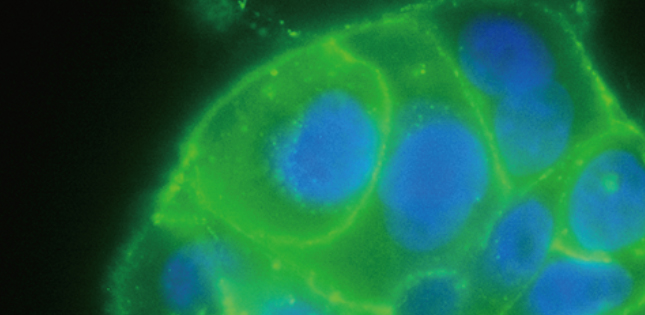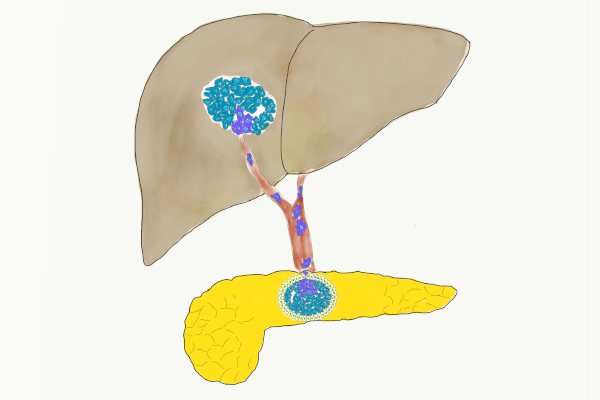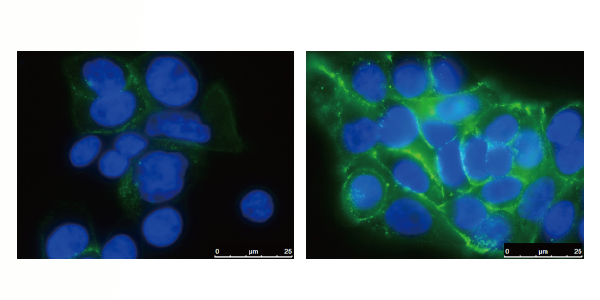
A multidisciplinary team of researchers at Japan's Tohoku University has found that a gene regulator, called BACH1, facilitates the spread of pancreatic cancer to other parts of the body. The scientists, who published their findings in the journal Cancer Research, say drugs that control BACH1 could improve disease prognosis.
"Pancreatic cancer is a malignant disease with one of the poorest prognoses," says biochemist Kazuhiko Igarashi, who led the study. "One of the reasons for this is that pancreatic cancer cells undergo rapid, profound metastasis to other organs, like the liver. We found how pancreatic cancer cells acquire this ability for metastasis."
Igarashi, surgeon-scientist Michiaki Unno and their team investigated the effects of silencing and over-expressing the BACH1 transcription factor in pancreatic cancer cells. Previous studies had already identified a role for this gene regulator in promoting breast cancer metastasis. But its role in pancreatic cancer was unknown. The team also grafted pancreatic cancer cells with and without the BACH1 gene disruption into mice. Finally, they studied BACH1 protein levels in human pancreatic cancer tissues and compared them to their survival rates.
Their investigations showed that BACH1 reduces the expression of some genes involved in cell-to-cell interaction, and enhances the expression of others that cause cells to lose their 'stickiness' to each other, making them more mobile and invasive.

BACH1 reduces cell-to-cell adhesion in pancreatic cancer cells, promoting their spread to other parts of the body, like the liver. ⒸTohoku University
For example, BACH1 was found to play a role in repressing the gene FOXA1 and activating the gene SNAI2, which ultimately leads to the suppression of a gene called CDH1. This gene codes for a protein called E-cadherin, one of the most important cell surface molecules involved in cell-to-cell adhesion.

Silencing BACH1 (right image) increases the production of E-cadherin (green), holding the pancreatic cells together and making it more difficult for them to metastasize. ⒸTohoku University
"By reducing or abolishing BACH1 activity, the metastatic potential of pancreatic cancer cells was greatly reduced in a mouse model," adds Igarashi. "We also found that patients at Tohoku University Hospital showed poorer prognoses when their pancreatic cancer cells expressed higher levels of BACH1."
Further investigations into BACH1's roles in pancreatic cancer metastasis could lead to the development of therapeutic strategies that reduce metastasis and thus improve the prognosis for people with pancreatic cancer, Igarashi explains.
The team next plans to look for other genes targeted by BACH1 in pancreatic cancer cells, which could have effects other than promoting metastasis.
- Publication Details:
Title: BACH1 promotes pancreatic cancer metastasis by repressing epithelial genes and enhancing epithelial-mesenchymal transition.
Authors: Masaki Sato, Mitsuyo Matsumoto, Yuriko Saiki, Mahabub Alam, Hironari Nishizawa, Masahiro Rokugo, Andrey Brydun, Shinji Yamada, Mika K. Kaneko, Ryo Funayama, Mamoru Ito, Yukinari Kato, Keiko Nakayama, Michiaki Unno, and Kazuhiko Igarashi
Journal: Cancer Research







